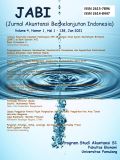Analisis Keputusan Pembagian Dividen yang Dipengaruhi oleh Investment Opportunity Set, Free Cash Flow, Kebijakan Hutang dan Collateralizable Assets
DOI:
https://doi.org/10.32493/JABI.v1i1.y2022.p89-106Keywords:
dividend policy, leverage, collateralizable assets, investment opportunity set, free cash flowAbstract
The background of this study is begins with the high intensity of competition that occurs in go public companies in the Bursa Efek Indonesia. The purpose of this study is to find out the amount of dividends distributed by the company and find out what factors affect the distribution of company dividends. Samples used in this study are obtained 20 companies, the company's sample consists of secondary data collected for data processing. 20 companies are samples that selected from index LQ45 population and constantly listing in index LQ45 since 2018-2020. The process of data processing using statistica tools Eviews-10. The final result of this study are simultaneously IOS, FCF, Leverage, and CA has significant affect to dividend policy; while the variable of leverage has negative affect but IOS, FCF, CA has no affect toward the dividend policy.
References
Arfan, M., & Maywindlan, T. (2013). Pengaruh arus kas bebas, collateralizable assets, dan kebijakan utang terhadap kebijakan dividen pada perusahaan yang terdaftar di Jakarta Islamic Index. Jurnal Telaah Dan Riset Akuntansi, 6(2), 194-208.
Apriliani, A., & Natalylova, K. (2018). Faktor-Faktor Yang Mempengaruhi Kebijakan Utang Perusahaan Manufaktur Di Bursa Efek Indonesia. Jurnal Ekonomi, 23(2). https://doi.org/10.24912/je.v23i2.366
Dewi, D. S., & Suryono, B. (2019). Pengaruh Kebijakan Dividen, Kebijakan Hutang, Dan Profitabilitas Terhadap Nilai Perusahaan. Jurnal Ilmu dan Riset Akuntansi (JIRA), 8(1).
Fadilla, M., & Alteza, M. (2016). Analisis faktor determinan keputusan pembagian dividen. Jurnal Manajemen Bisnis Indonesia, 53(9), 1689-1699.
Hariyanti, N., & Pangestuti, I. R. D. (2021). Pengaruh Profitabilitas, Leverage, Likuiditas, Collateralizable Assets, Dan Growth In Net Assets Terhadap Kebijakan Dividen Dengan Firm Size, Firm Age, Dan Board Size Sebagai Variabel Kontrol. 10(3), 1–15.
Indonesia Stock Exchange. (2021a). Evaluasi Mayor Indeks LQ45 No. Peng-0021/BEI.POP/01-2021.
Indonesia Stock Exchange. (2021b). Profil Perusahaan Tercatat. https://www.idx.co.id/perusahaan-tercatat/profil-perusahaan-tercatat/
Irawati, W. (2018). The Effect of Free Cash Flow, Size, and Growth with Profitability as Moderating Variable on Earning Response Coefficient in Property Sector. EAJ (Economic and Accounting Journal), 1(1), 76-86.
Lindi, L., Paramitha, Y., Sitepu, H. E. B., Tampubolon, S. D. E., Ginting, W. A., & Purba, M. N. (2021). Pengaruh Cash Ratio (CR), Total Asset Turnover (TATO), Return On Assets (ROA) Terhadap Dividend Payout Ratio (DPR) Pada Perusahaan Sektor Aneka Industri dan Industri Barang Konsumsi yang Terdapat di Bursa Efek Indonesia Tahun 2013-2017. Jurnal Ilmiah ESAI, 13(2), 107–123. https://doi.org/10.25181/esai.v13i2.1305
Maharsi, A. V. N., Puryandani, S., & Kristanto, R. S. (2019). Pengaruh Investment Opportunity Set Terhadap Kebijakan Dividen Dengan Firm Size Sebagai Variabel Moderasi Pada Perusahaan Manufaktur Tahun 2011-2013 Di Bei. Magisma: Jurnal Ilmiah Ekonomi Dan Bisnis, 5(2), 39–49. https://doi.org/10.35829/magisma.v5i2.26
Mangundap, S., Ilat, V., & Pusung, R. (2018). Pengaruh Leverage Dan Free Cash Flow Terhadap Kebijakan Dividen Pada Perusahaan Indeks Lq45 Yang Terdaftar Di Bursa Efek Indonesia Tahun (2012-2016). Going Concern : Jurnal Riset Akuntansi, 13(02), 569–577. https://doi.org/10.32400/gc.13.02.19844.2018
Otoritas Jasa Keuangan Republik Indonesia. (2020). Peraturan Otoritas Jasa Keuangan Republik Indonesia Nomor 43/POJK.04/2020.
Pamungkas, N., Rusherlistyani, & Janah, I. (2017). Pengaruh Return On Equity, Debt To Equity Ratio, Current Ratio, Earning Per Share dan Investment Opportunity Set Terhadap Kebijakan Dividen. Jurnal Analisa Akuntansi Dan Perpajakan, 1(1), 34–41. https://ejournal.unitomo.ac.id/index.php/akuntansi/article/view/94
Putri, P. S. A., Kepramareni, P., & Yuliastuti, I. A. N. (2020). Pengaruh Investment Opportunity Set (IOS), Laba Bersih , Likuiditas dan Leverage Terhadap Kebijakan Dividen. Jurnal Kharisma, 2(2), 209–227.
Rahayu, I. T. (2021). Pengaruh Investment Opportunity Set , Profitabilitas , dan Likuiditas Terhadap Kebijakan Dividen pada Sub Sektor Food And Beverages yang Terdaftar di Bursa Efek Indonesia Tahun 2014-2019. 3(4), 727–737.
Rohman, A. T., Mardani, R. M., & Wahono, B. (2019). Analisis Pengaruh Investment Opportunity Set, Firm Size Dan Profitabilitas Terhadap Kebijakan Dividen. Jurnal Ilmiah Riset Manajemen, 8(2).
Sejati, F. R., Ponto, S., Prasetianingrum, S., Sumartono, S., & Sumbari, N. N. (2020). Faktor-Faktor Yang Mempengaruhi Kebijakan Dividen. Berkala Akuntansi Dan Keuangan Indonesia, 5(2), 110. https://doi.org/10.20473/baki.v5i2.21480
Sidharta, C. A., & Nariman, A. (2021). Pengaruh free Cash Flow, Collateralizable Assets , dan Kebijakan Hutang Terhadap Kebijakan Dividen. Jurnal Multiparadigma Akuntansi, 3(1), 183–190.
Suartawan, I. G. N. P. A., & Yasa, G. W. (2017). Pengaruh investment opportunity set dan free cash flow pada kebijakan dividen dan nilai perusahaan. Jurnal Ilmiah Akuntansi dan Bisnis, 11(2), 63-74.
Sugiyono. (2017). Metode Penelitian Kuantitatif, Kualitatif, dan R&D. CV Alfabeta, Bandung.
Wulandari, D. U., & Suardana, K. A. (2017). Pengaruh Profitabilitas, Kesempatan Investasi , Free Cash Flow, Dan Debt Policy Pada Kebijakan Dividen Perusahaan Manufaktur. 20, 202–230.
Downloads
Published
Issue
Section
License
Authors who publish with this journal agree to the following terms:
- Authors retain copyright and grant the journal right of first publication with the work simultaneously licensed under a Creative Commons Attribution License that allows others to share the work with an acknowledgement of the work's authorship and initial publication in this journal.
- Authors are able to enter into separate, additional contractual arrangements for the non-exclusive distribution of the journal's published version of the work (e.g., post it to an institutional repository or publish it in a book), with an acknowledgement of its initial publication in this journal.
- Authors are permitted and encouraged to post their work online (e.g., in institutional repositories or on their website) prior to and during the submission process, as it can lead to productive exchanges, as well as earlier and greater citation of published work (See The Effect of Open Access)

This work is licensed under a Creative Commons Attribution-ShareAlike 4.0 International License.


 PUBLICATION ETHICS
PUBLICATION ETHICS FOCUS AND SCOPE
FOCUS AND SCOPE EDITORIAL TEAM
EDITORIAL TEAM REVIEW PROCESS
REVIEW PROCESS CONTACT US
CONTACT US AUTHOR GUIDELINES
AUTHOR GUIDELINES




